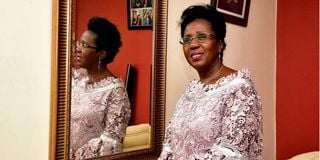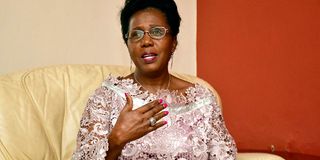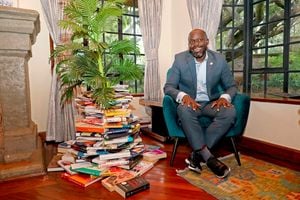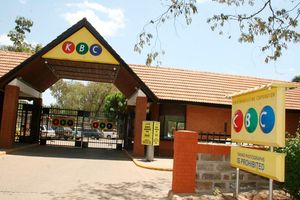
Elizabeth Oywer poses for a picture after the interview at her home on June 21 2024.
It has been six years since Elizabeth Omollo Oywer retired. Even so, getting an appointment with her is not as easy as it would be with retirees. She worked as a nurse and lecturer for about 40 years, and hers is a happy retirement. She has managed to make the most of her newfound free time.
Elizabeth still maintains a busy schedule, often doing consulting work. “Mostly for fulfilment, not for money,” the 66-year-old says.
Before she retired, she was the registrar and CEO of the Nursing Council of Kenya (NCK). She has also served as a board member of the International Council of Nurses, representing Africa.
“I am a retired nurse but not tired,’’ she tells Lifestyle during an interview at her Nairobi home.
When we meet her, it is hard to miss her sense of fashion. She is wearing matching earrings, a neck chain, and a silver dress and is having a virtual meeting with her husband of 44 years, Joseph Oywer. He excuses himself as we start off our chat.
After over 40 years of working and being busy, one would imagine that in retirement, you'd totally hang up your career boots.
An idle mind is the devil’s workshop. As Christians, when we are given gifts and talents, we're supposed to use them to make an impact in society, and this does not end until we go to the grave. So I choose to continue contributing to my nursing profession and empowering nurses through leadership and consultancy. I am also very passionate about what I do, and words from one of my teachers back in the 70s keep me going. He used to tell us that ‘if you stop using your brain actively, then you become fit for the museum very fast.’
How did you prepare for retirement and what helped you transition?
I am happy to say that I did not have any struggles, and this is because, towards the end, I was moved from a very busy schedule at the Nursing Council back to Mathare Hospital. That transition slowed me down. It gave me time to reflect and start building on my consultancy. I widen my network while at this stage. Most of the consulting work I do comes mostly from people I worked with and created connections with at this stage. Having me-time and self-care towards the years of my retirement also helped me. I was very intentional with my me-time routine. Every Wednesday afternoon, I’d check myself into a salon and just close my eyes as the attendant worked their magic on me. This would give me clarity and I would be able to think about and plan for retirement.
What do you miss most about active employment?
Nothing really. I served my time, and I am content with how I performed. (Thinking hard.) Maybe what I miss is talking and interacting with the committed team I worked with. But still, most of them are my social contacts, and we go to conferences together, so we are constantly in touch.
What is your advice to anyone preparing to retire?
We keep on telling people to prepare for retirement, but we don't tell them how to retire. So the time comes, and you find a few people who will still be dressing, as usual, to go to work because they can't take it that they just stay in the house. Some, unfortunately, retire and, shortly after, die. My advice is to start thinking about retirement immediately after you get employed, because it will eventually come. Start saving little by little, establish networks, and keep in touch with these contacts. Another important factor is to be actively involved in every aspect of the community. You do not want to retire and have no relationship whatsoever with your neighbours. Most importantly, take care of your family and have a great relationship with them. At the end of the day, these are the people you go back to after retirement.
How did your childhood shape who you are today?
I grew up in Siaya County in a village called Ruma, deeply influenced by the African Inland Mission (AIC) community, which valued education and church. My late father was an AIC elder, and our home was a hub for Sunday school and church activities. This upbringing instilled in me strong values of faith and education. We were seven siblings, and being that my dad was an administrator and a church leader, we were always neat, and thankfully we had shoes, which was not the norm then. As siblings, now we share a very strong bond but as a child, I’d pick fights with any of my siblings who tried to take my shoes or clothes. I was a peacock, very protective of my clothes and shoes. (Laughs)
You chose nursing at a relatively young age. What inspired your career path?
My strong performance in sciences, particularly in maths and biology, guided my career choice. Although nursing was initially discouraged as a career for top-performing students like myself, I was determined. Back in the day, we had Career Masters and Provincial Matrons who would hold talks in high schools, and they visited my school, Lwak Girls High School, which solidified my decision to pursue this career path.
What were some pivotal moments?
I did general nursing at Kenya Medical Training College (KMTC). My interest in mental health led me to pursue a higher national diploma and a Master's degree in the field. Over the years, I transitioned into teaching at the Mathare School of Nursing and later into administration, culminating in leadership roles such as the Director of Nursing Services for Kenya.
What were some significant achievements during your tenure at the Nursing Council of Kenya?
At the Nursing Council of Kenya, we established a comprehensive nursing database, revolutionised nursing education by upgrading over 10,000 certificate nurses to diploma and degree levels, and developed regulatory tools and standards. These initiatives significantly advanced the nursing profession in Kenya and served as models for other African countries. Additionally, I led the construction of a multimillion-shilling plaza for the Council and ensured that the Council became the first board to initiate ISO certification. Our efforts also led to the enactment of the long-stalled Nurses’ Bill into law, thus operationalising private practice for nurses in Kenya.

Elizabeth Oywer gestures during the interview at her home on June 21 2024.
Is mentorship important in nursing?
Mentorship is crucial at all stages of a nursing career. It helps students choose the right subjects and guides career advancement. Even now, as a retired nurse, I mentor aspiring nurses, emphasizing the importance of proper career guidance, ethical practice, and continuous professional development.
What are some challenges you faced in your career, and how did you overcome them?
One significant challenge was the politicisation of nursing, which led to my reassignment back to Mathari Hospital. Another challenge was balancing family responsibilities while pursuing higher education, which required careful time management and prioritisation.
How did you manage to juggle all these balls without dropping any?
Balancing these commitments requires a structured approach and strong support systems. I maintain a schedule that allows me to fulfil my duties as a professional, family member, and church leader.
Looking back, is there anything you would have done differently?
No, I would still choose nursing. It has allowed me to impact lives. Nursing is a profession that opens many doors and provides opportunities for personal and professional growth.
What keeps you awake at night?
I often think about the future of nursing and how we can continue to advance the profession. This includes writing about my experiences to share the wealth of knowledge and lessons I've gained. Additionally, I focus on family and church responsibilities, ensuring that I contribute positively to both.
What kind of leader are you?
I am a strict but compassionate leader, balancing deadlines with empathy. Leadership is a service and not a position. It requires a combination of education, exposure, and fear of God. On my journey to leadership, I went through the stairs, not the lift.
As a grandmother, how do you describe your relationship with your grandchildren?
Yeah, I am a mom of four adult children and a proud grandmother of two adorable grandchildren. I am a compassionate but strict grandmother. I believe in formative discipline, setting clear expectations, and reasoning with my grandchildren. It's important to balance love and discipline to help them grow into responsible individuals.
What are some highlights of your international work and recognition?
Representing Africa at the International Council of Nurses was a significant achievement. Additionally, I have been a board member of the East Central and Southern Africa College of Nursing and an executive member of the Global Network for Public Health Nursing Africa Chapter. I received the RADM Julia Plotnick publication award in 2007 for my contributions to public health and nursing policy, and the Presidential Award OGW in 2011 for my work in nursing education, practice, and research in Kenya. Currently, I serve as the Registrar for ECSACON, a member of the WHO Technical Working Group on Regulations, and at the Africa Institute for Regulatory Affairs (AIFRA). These recognitions validate the impact of my work on a global scale.
What advice would you give to young nurses and those aspiring to join the profession?
Seek mentorship, continuously pursue education, and remain dedicated to the profession. Nursing requires a balance of compassion and competence. As the profession evolves, staying informed about global trends and regulatory standards is crucial for career growth.
You have aged gracefully; do you maintain a diet?
Due to my busy schedule, I follow a structured meal plan, ensuring that my diet is balanced and healthy. My favourite meal is ugali, which I eat at least three times a week. I also enjoy githeri, especially on Sundays, as it brings back fond memories of my childhood and high school.






